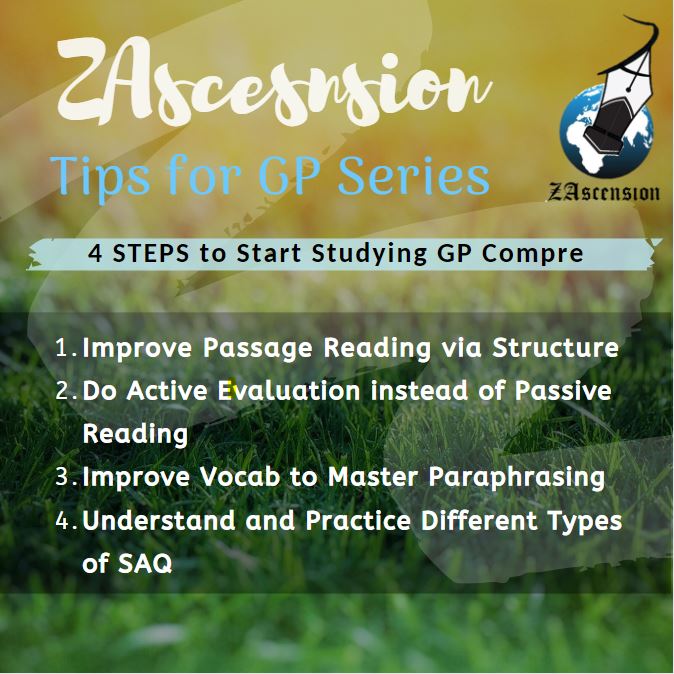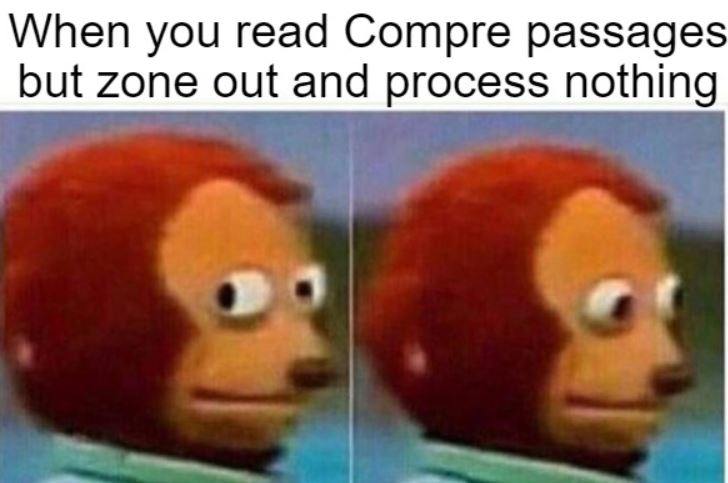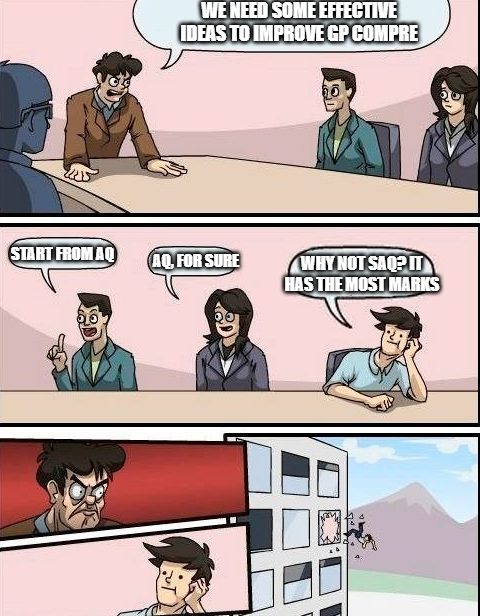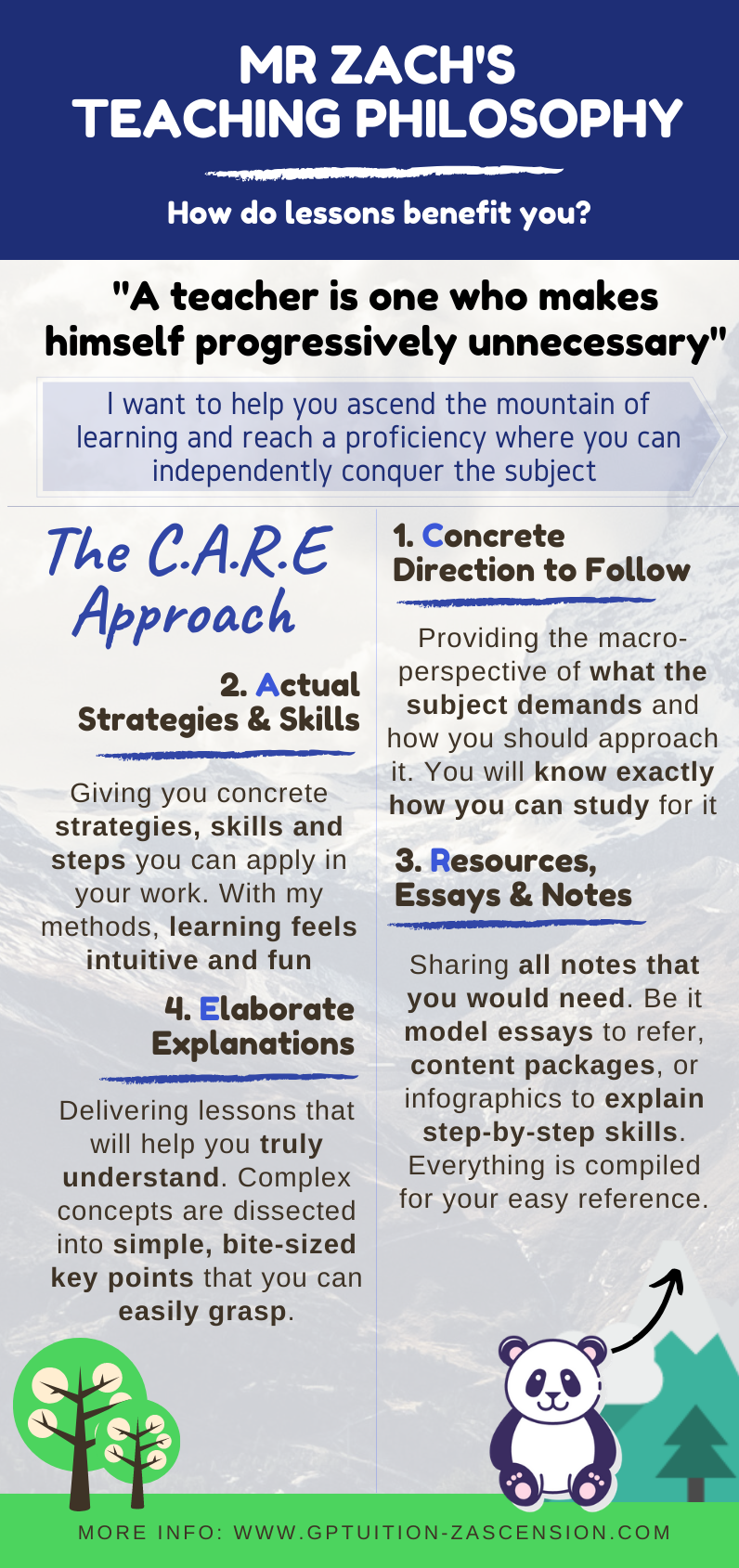It’s now May it is the new holiday period because of circuit breaker. I hope you guys are all feeling alright amidst the disruption and stress. This is probably also the best time for you to catch up on weaker subjects and find a concrete direction for improvement that you can pursue in the months to come!
It is the midway mark and i remember that as a student, this was the time which i improved the most because i finally had time to sit down and think about my subjects. Yes, you heard right, think. The months usually just go by quickly and i never had the time to pause and reflect on what my weak points are or how i want to go about tackling them. Mid-year holidays was when i could really review my learning and devise new strategies to improve.
Here are 4 simple steps to START studying for GP Compre (Paper 2), this will hopefully kickstart your blueprint strategy for studying GP (Check out Part 1 on Essay here if you have missed it previously, and check out 2019 A Levels Essay questions here):
1. Focus on improving Passage Reading Skills via Structure
Passage Reading?! Yes, passage reading! We often underestimate the importance of passage reading. Most students would probably spend maximum 5 minutes to quickly scan through the passage and move on to answering the questions. The passage reading step is actually one of the most critical, and the biggest determinant of what marks you will be getting for compre.
Realise that the 5 minutes of reading determines whether you truly understand the ideas of the passage! If you attempt the questions without a solid understanding, it will be very difficult because to pick out the correct answers for literal SAQ, or correct clues for inferential SAQ, or explaining the language SAQ with context — all of which require you to deeply understand the issues and views brought up in the passage. Even for summary and AQ, to do a good job, it all goes back to understanding the passage, because you need to pick out the right points. Picking out the right points involves true understanding.
The good news is, there is a very simple way to improve passage reading. Structure. The essence of a compre passage is essentially a GP essay, because it is also expressing arguments about an issue. Just like you write an essay to make arguments about an issue, the author’s passage is also doing the same. The key to understanding a passage is to be sensitive to its structure, where you are actively thinking about its structure, compared to an essay — something you are familiar with. Here are some pointers you can consider:
- What is the thesis/stand?
- Is it a one-sided or two-sided argument?
- What are the main points/arguments?
- Which paragraphs build up to which arguments?
- What is the purpose of each paragraph, how does it reinforce the stand?
- Is this particular paragraph the author’s argument, or is it a counter-argument by others?
- Why is the example significant for the argument? (Like how you write examples in your essay to support your point)
Pro Tip: Don’t be afraid to spend more time on reading (You can spend 10-12 mins reading, instead of 5). Spending the time now would help you move quicker when you answer questions later on. The benefit is that you attempt questions with a solid understanding rather than a vague one
The main idea here is to try and consciously and analytically read the passage rather than zone out and think about maybe whether you want to have mala for lunch🙃 Believe me, i was once a student and i was so used to zoning out and just getting through the whole passage. At the end of it, i feel like i haven’t really understood much and it’s all just fuzzy.
Paying attention to structure helps you remain focused on your reading. Focus is key to understanding!! The answers to the above questions are also quick strategies to help you identify the main points; this would be very helpful in understanding the gist and key issues of the entire passage. Your understanding here will definitely help you make sense of the questions later on.
2. Do Active Evaluation instead of Passive Reading
There is a significant difference between evaluating a passage and simply reading it. Evaluating means actively thinking about the points that have been raised, questioning them and responding to them. Passive reading is when you just absorb the points… or even be distracted by mala.
So what should be going through your mind in active reading? We talked about the structure, but this part here emphasises more on you forming an opinion and contemplating the author’s points. It is no longer just understanding, it goes one step further into responding. These are the questions that could be going through your mind:
- Does the author make sense?
- What assumptions is the author making?
- Do I agree with the author?
- How would it play out differently in Sinagpore?
- Has the author value-added to my understanding of this issue?
- What is strong/weak about the author’s arguments?
You may realise that this is akin to the planning step before answering the AQ, and you’re right! The difference is this step of evaluation and application should not only come at the end when you attempt the AQ. It would be far more useful if you do it during the passage reading part because when you evaluate you are engaging with the passage. Engaging with the passage will lead to at least a 50% increase in your understanding.
Pro Tip: Have an inner voice that is speaking and questioning as you read. You are not just absorbing points, remember that you are responding and evaluating them!
Deep understanding is when you are able to critique and assess the quality of the arguments, whereas superficial understanding just means you can guess what points are being made but you have no opinions about them. Incorporating the AQ thinking into the reading step will help you effectively answer the questions because you would know the content so well. In essay, content has to be prepared for; in compre, content is simply taken from the passage. Instead of writing content, your role in compre is to understand this content and actively evaluate it later on in the questions.
3. Improve Vocab to Master Paraphrasing
Paraphrasing can be your best friend or your worst nemesis for compre! Note that language marks is 15/50, which is 40% of the paper. Getting a 7-8 for language instead of 10-11 could be significant enough to affect an entire grade. Also, take note that paraphrasing does not just affect the language marks, it would affect all your other components as well, which is the remaining 35/50. Here’s how language comes into play:
SAQ – Paraphrasing literal questions, Finding the right words to express answer for inferential questions, Understanding the meaning and application of different literary devices and choice of words, Being sensitive to the author’s tone and attitude
Summary – Paraphrasing is a huge deal for summary, you would probably have experienced this. Picking out the right points is not the difficult part of summary; paraphrasing is. Paraphrasing works when you have the right vocab
AQ – When referencing the author’s points, language marks would be awarded for answers that masterfully paraphrase and re-express the author’s points. And of course, the entire AQ is a mini-essay and we all know that language is crucial for essay, to help express articulate points, provide depth and give personal voice
So, how do I improve my paraphrasing skills? It’s simple! All you need to do is improve your vocabulary and an easy way is to do a little bit of vocab each day. The trick is to accumulate the words rather than try to learn 100 a day.
All you need to do is to learn 5 new words each day. On day 1, you learn 5. On day 2, you learn another 5 and revisit the 5 from day 1.
Day 1: 5 new
Day 2: Revisit 5 from Day 1, Another 5 new
Day 3: Revisit 10 from Days 1, 2. Another 5 new
Restart this cycle each week so that you don’t have to revisit 100+ words. Continue this process and each month you will get about 140 new words, which will be extremely helpful for your vocabulary repository! 😃
Pro Tip: You can find new words from the SAT list. Just google SAT words, here’s the link for your easy reference. You don’t have to do words from the same alphabet, you can vary so that it’s more interesting and probably easier to remember when your words are less similar.
Remember that improving vocab is an easy investment that will give you incredible returns. It isn’t just for compre, it will also significantly boost the standard of your essays. It is not because you ‘fluff’, but vocabulary is definitely critical to expressing nuanced ideas and articulating them in a persuasive manner that is filled with personal voice. Getting an A for essay is much easier when you have strong language to enhance your essay.
These words will also help you in the future, when you are writing university application essays or job cover letters and many more. Language will always be a huge part of our lives 😃
4. Understand the Types of Short-Answered Questions (SAQ)
Many students rush to work on their AQ when they want to improve Compre. The truth is, the first step to improving Compre should pertain to SAQ. Now, you may wonder why. It is a simple truth. SAQ has the most marks for Compre: 17 for SAQ, 8 for Summary and 10 for AQ. SAQ offers you the most space and potential for improvement.
Getting more SAQ correct is far easier than trying to improve AQ from say a 4 marks to a 7 marks. That 3 marks in SAQ could come from getting one extra question correct whereas getting a 7 in AQ is much more challenging because the quality of a 4 marks AQ vs a 7 marks AQ is comparable to the difference between a C-grade Essay and an A-grade Essay.
Hence, if we are talking about the first 4 steps to improving Compre, you should definitely focus your efforts on SAQ first! You can always work on Summary and AQ in the later months. Also not forgetting that improving your essay would also contribute greatly to naturally improving your AQ, and you can check out our tips for essay here if you haven’t seen them!
So how do we improve SAQ? An easy strategy is to first understand that there are different types of SAQ, and also understand the differences in how you approach and conquer these different types.
1. Literal SAQ: Answers found in the passage, all you have to do is paraphrase
2. Inferential SAQ: Answers not found in the passage, you have to deduce the answers based on clues. Focus on searching for clues in the passage. The answer is hinted at but not said by the author
3. Language/Literary Devices/Punctuation SAQ: Always focus on explaining the device (e.g. metaphor, imagery, irony, rhetorical question, italics, quotation marks etc.), and then applying it to the context of the passage. It’s two steps: explain device + apply to context
4. Author’s Tone/Attitude SAQ: Figure out the author’s tone/attitude by using your understanding of the passage. This is where step 1 would come in handy, when you master passage reading and develop a strong understanding of the author’s ideas and intentions
Pro Tip: Always pay attention to mark allocation, no matter for which type of SAQ, because it will give you an idea of how many points you need to find!
You can easily practice SAQ by focusing on the type of question you are weakest at first, before moving to other types. Remember, practice doesn’t mean tediously doing a compre every single day. The first step is to look at some of your past practices and see where you usually lose marks for SAQ, in order to determine which type to work on. From there, you can do different questions related to this type of SAQ, master it and then move on to the next step.
My time as a student has taught me that effective practice is targeted practice in small quantities but done repeatedly and consistently. It is not general practice of the entire subject. Instead of practicing 1 entire compre each day, it would work better if you practice for example, 3 inferential questions each day and master inferential questions. Being focused helps you master skills whereas doing a general practice of an entire compre paper will only be helpful nearing the end of the year!
_____________________________________________________________________________________________________________________
We are happy you stopped by ZAscension! If you need extra help that is more comprehensive and more personalised, don’t be afraid to seek it, we are more than happy to guide you in this journey.





